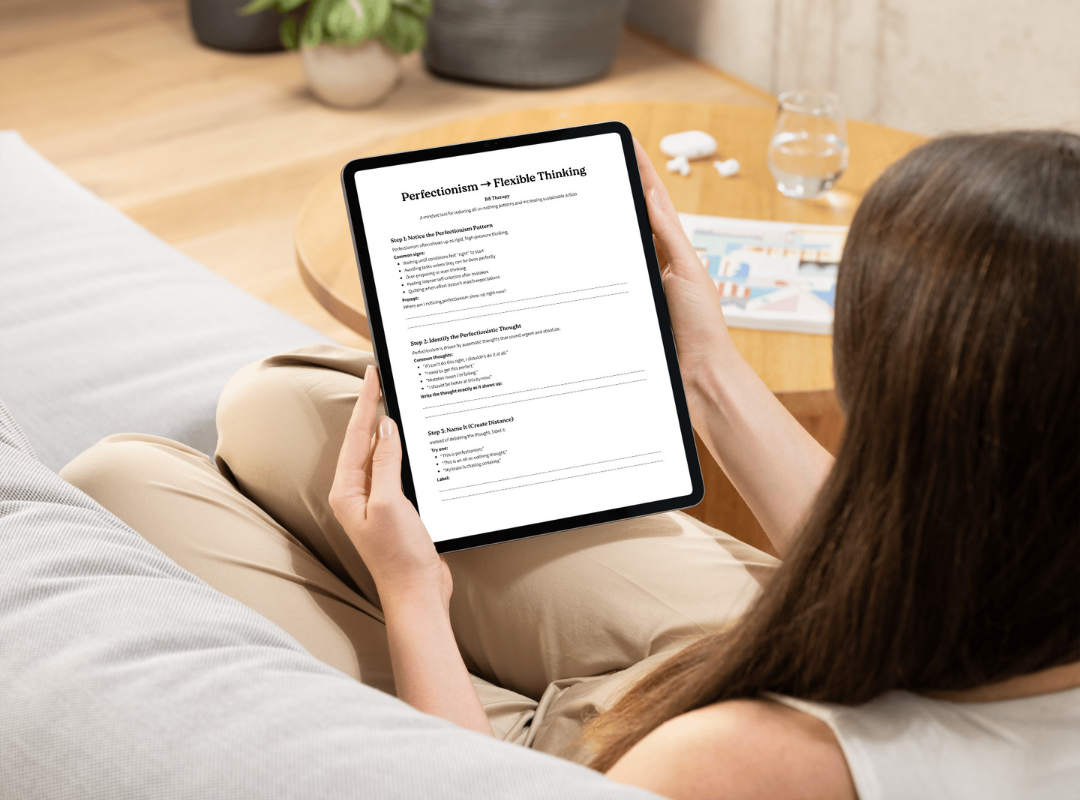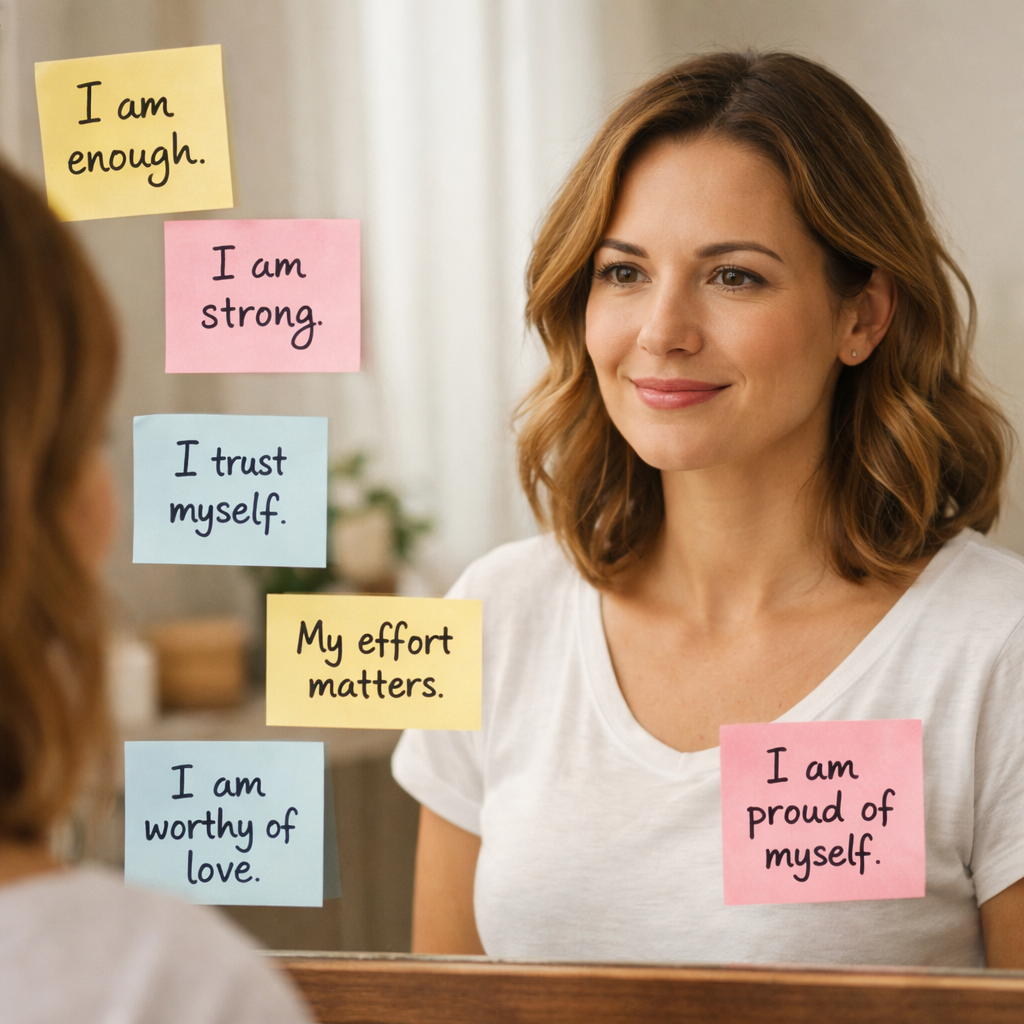Mindset Matters
Through this blog, I share the lessons, practices, and strategies that empower my clients—so you can find guidance, encouragement, and support too.Nervous System Regulation Skills & Coping Menu
A nervous system regulation menu offers flexible coping tools for anxiety, overwhelm, and shutdown. Learn how to choose skills based on your body’s needs — not pressure or perfection.
Perfectionism Isn’t High Standards — It’s a Fear-Based Mindset
Perfectionism isn’t about high standards — it’s a fear-based mindset that fuels anxiety, avoidance, and burnout. Learn practical tools to shift from rigid thinking to flexible, sustainable action.
How to Tell You’re in an Anxiety Spiral — and How to Get Out of It
Anxiety spirals can make your thoughts feel uncontrollable and your body stuck in fight-or-flight. Learn how to recognize the signs and use practical tools to interrupt anxiety and regain clarity.
Self-Affirmation and Learning to Validate Yourself
Self-affirmation is the ability to validate yourself without relying on others for reassurance or approval. In this post, we explore why internal validation matters and practical steps to strengthen your self-affirmation skills.
The Highest Form of Intelligence Isn’t IQ — It’s Metacognition
Metacognition is the ability to observe your thoughts instead of automatically reacting to them. This powerful skill supports emotional regulation, nervous system awareness, and lasting personal growth.
The Mental and Physical Health Benefits of Walking (Why Your Nervous System Loves It)
Walking supports mental health, reduces stress, regulates blood sugar, and calms the nervous system—without dieting or exercise pressure.
How to Turn Your iPhone Reminders App into a Habit Tracker
You don’t need another app to build better habits. Your iPhone already has a habit tracker built in. This step-by-step guide shows you how to turn the Reminders app into a simple, sustainable routine system that actually fits your real life.
Mindset Is the Foundation for Lasting Change
A strong mindset is the foundation for lasting behavior change. Discover how self-love, interoception, and internal motivation help you build habits that remain flexible, sustainable, and resilient—even when life shifts. Learn why mindset matters more than discipline alone.
Redefining Failure: Why It’s Not a Red Flag—It’s Data
A fresh take on failure: instead of seeing mistakes as personal flaws, learn how to view them as valuable data that fuels growth, resilience, and emotional freedom. Discover how a simple mindset shift can transform stress into self-trust—and help you pivot with confidence.
What Is “Healthy,” Really? Reclaiming a Word That Feels So Heavy
In this blog, we explore a more compassionate definition of health — one rooted in flexibility, values, and choices that actually support your body and mind. Learn how nourishment, movement, rest, and emotional safety work together to create a sustainable, shame-free approach to wellness.
Taking Care of Yourself Isn’t Selfish — It’s Essential
So many of us give everything we have to others — until we’re running on empty. This post explores why taking care of yourself first isn’t selfish, it’s essential. Learn how self-care helps you stay grounded, balanced, and truly present for the people you love.
Plan Ahead to Protect Your Peace: Preventing Holiday Burnout Before It Starts
Feeling stretched thin by holiday plans? Learn how to plan ahead, protect your peace, and make space for self-care so you can actually enjoy the season.
Getting Unstuck: Science-Backed Tips for Pulling Yourself Out of Depression
Feeling stuck in depression can make even simple things—like getting out of bed or texting a friend—feel impossible. This post shares 7 realistic, research-supported steps to help you move through depression, rebuild energy, and reconnect with hope at your own pace.
From Scarcity to Abundance: How Shifting Your Mindset Changes Everything
Do you often feel there’s never enough time, money, or opportunity? That’s the scarcity mindset at work. In this post, we’ll explore what scarcity and abundance mindsets really mean, how they shape your emotional and physical well-being, and small steps you can take to start thinking — and living — from abundance.
3 Tips for Setting (and Keeping) Healthy Boundaries
Boundaries aren’t walls—they’re bridges to healthier relationships.
Check out this blog on how to set and keep boundaries that align with your values and protect your peace.
Pause and Choose: How to Respond Instead of React
We can’t always control our first thought—but we can control our second. In this blog, K8 Therapy explores how the Pause and Choose tool helps you slow down, regulate emotions, and respond intentionally instead of reacting automatically. Learn how small pauses can create powerful shifts in awareness and behavior.
The Power of Boredom: How Embracing Downtime Can Boost Your Creativity and Emotional Resilience
Boredom isn’t a flaw—it’s a tool. Discover how embracing moments of low stimulation can spark creativity, build patience, and improve self-awareness.
Reframing Your Mindset: How to Break Free From Thoughts That Hold You Back
Your thoughts shape your brain’s pathways—and your life. Discover how to reframe limiting beliefs, create new thought patterns aligned with your values, and strengthen them through daily repetition, writing, and speaking them aloud.
The Power of Journaling in Therapy: Creating Space to Heal and Grow
Journaling is more than writing down your thoughts—it’s a powerful tool to support therapy, process emotions, and shift your mindset. This post explores the benefits of journaling in therapy and offers simple tips to get started, even if writing isn’t your favorite activity.
The Bookshelf and Spotlight Visualization: A Practical OCD Coping Skill
Intrusive thoughts can feel overwhelming with OCD, but you don’t have to fight every thought. In this post, you’ll learn how the Bookshelf and Spotlight visualization works, follow a guided script, and see how it can be used alongside ERP therapy to manage OCD.




















